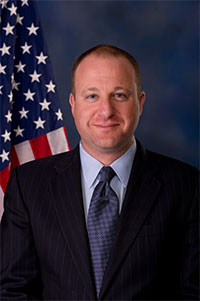House LGBT caucus shows division during budget battles
Out of 33 contentious roll call votes in the House in October, Rep. Sean Maloney (D-NY) and Kyrsten Sinema (D-Ariz) have voted with Republicans 10 times. Rep. Jared Polis (D-Colo.) has done so six times.
The votes have included amendments seeking to defund or delay President Obama’s Affordable Care Act, a measure that most, if not all, LGBT organizations support.
The Republican efforts have failed thus far because most of the bills involved required two-thirds majority to pass the House. The votes have seldom reached that threshold, plus they have no chance of passing the Democratic-controlled Senate.
But some activists are taking notice of Democrats crossing the aisle and they’re not happy about it.
In a blog for Huffington Post, gay political commentator Michelangelo Signorile singled out two of the three for frequently voting with Republicans and conservatives.
“Since taking office, Sinema has voted with the GOP against economic justice issues that progressives, including LGBT activists, view as crucial,” wrote Signorile. “Both she and U.S. Rep. Sean Patrick Maloney, an openly gay former Clinton aide…have voted with big ganks and Wall Street time and again.” Sinema and Maloney, he said, “voted to jeopardize Obamacare or shut down the government.”
“Think about this: On what is arguably the most important debate in Congress, two of nine Democrats who voted with the tea party-led blackmailers are openly gay or bisexual,” wrote Signorile. “Two of only five openly gay or bisexual members of the House voted with the extreme far right to undermine the president.
At a gay media forum in New York City October 2, Ann Northrop, co-host of GayUSA (gayusatv.org), said it was “horrible” that gay and bisexual Democrats in Congress were voting with the GOP, calling them “Republicans in sheep’s clothing or Democrats in name only.”
“What that does,” she said, “… is give the Republicans cover to say [their bills are] bipartisan…. They’re basically saying everybody should be compromising –that’s ridiculous.”
Sinema and Maloney were two of 17 Democrats to vote September 29 for a continuing resolution (CR) bill that included amendments to repeal a funding mechanism and delay implementation of the Affordable Care Act (ACA), President Obama’s health care reform law. Sinema and Maloney were two of nine Democrats to vote October 1 for a CR that included an amendment to delay the ACA’s individual mandate.
Sinema and Maloney have taken particular heat for being among 22 Democrats to vote with the GOP in July to delay a key provision of the ACA –the individual mandate.
Sinema told the Arizona Republic she supported a one-year delay because some states have not yet created online “marketplaces” where citizens can sign up for specific insurance plans.
“A one-year delay of the individual mandate,” Sinema told the Republic, “will ensure that Arizonans get that certainty.”
A spokesperson for Polis said, “Jared is committed to working with Democrats and Republicans to re-open the federal government. He believes that we have the opportunity to do that if Speaker Boehner will allow for a vote on a clean CR. In particular, Jared is proud to have supported a bi-partisan bill that would reopen our National Parks so that the many jobs that revolve around tourism and Rocky Mountain National Park in areas like Estes Park in Colorado, are safe.
And a spokesperson for Maloney said the New York representative voted for a continuing resolution to fund the government because he has “thousands of federal employees” in his Congressional district. And while he voted for a CR that would have delayed penalties for individuals who did not sign up for health insurance by the deadline, she noted that President Obama secured a similar delay for businesses, and Maloney believes families should have the same “flexibility.”
Not everyone is critical of the partisan jumps.
Richard Socarides, a political commentator for New Yorker magazine and former White House aide, said he thinks “one could legitimately disagree with some of positions they have taken on the merits, depending on your point of view.” But he added that “it’s not right or smart to say that because they are LGBT Democrats they should always support the president and never work with Republicans.”
Political blogger Mike Rogers said it’s important to look at the individual votes. For instance, Polis voted with Republicans October 4 to support a continuing resolution that would have restored funding to the Federal Emergency Management Agency (FEMA).
“Jared’s district … just went through a devastating flood,” noted Rogers. “If he voted against [the FEMA funding], he’d be followed by a mob.”
He gets why Sinema would have voted with Republicans to support a continuing resolution for the National Park Service.
“Arizona’s economy is in real trouble. The parks there are their lifeblood in many areas,” said Rogers.
But he says Sinema was wrong to vote to delay the ACA.
“A one year delay will kill Obamacare. Period. It will be over and
never pass in another 70 years,” said Rogers.
“I’m not saying that I would rather see a GOPer than Sinema, Maloney or the rest,” said Rogers, “but we still need to pressure these people to be Democrats.”
An October 11 article in MotherJones notes that a few Democrats, including Sinema and Maloney, “serve in districts carried by Mitt Romney in 2012,” and are considered vulnerable in 2014. But Polis, the article notes, is in a safe Democratic district. A spokesman told MotherJones that Polis wants a “clean” continuing resolution but that he was proud to support one that included funding just for the National Park Service “so that the many jobs that revolve around tourism and Rocky Mountain National Park…are safe.”
Notably, all six LGBT House members signed onto an October 5 letter to House Speaker John Boehner, demanding a vote on a continuing resolution that is free of controversial amendments.



Leave a Reply